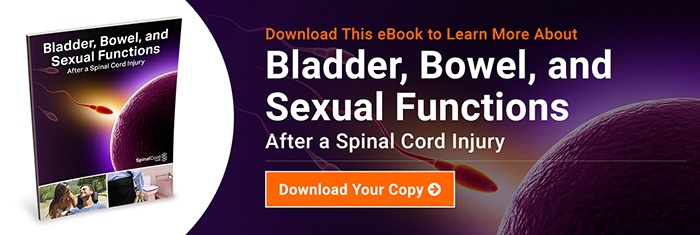Essential Oils to Help 5 SCI Ailments
The Egyptians may have been one of the first societies to harness the power of essential oils, but they are more popular than ever before in modern day-Western society, and people with spinal cord injuries should take note of their impressive abilities. From preventing muscle spasms to helping cure UTI's, they are perfect for anyone trying to stay away from over-medicating.
5) Muscle Spasms/Spasticity
While Baclofen may be one of the most highly-used medications for muscle spasms by people with spinal cord injuries, there are essential oils that can help ease muscle spasms and stiffness as well. One of the most recommended essential oils for muscle spasms is black pepper. Lemongrass, bergamot (Italian lime) and Roman chamomile all help ease muscle spasms. The best way to ingest these oils to have the best effect on muscles is via a massage. Any essential oil can be mixed with a carrier agent, like baby oil. Just add a few drops to any bottle. Inhalation/aromatherapy can be used as well.
4) UTIs
One of the most life-threatening conditions that can occur to people with spinal cord injuries is chronic UTIs and taking so many antibiotics that you eventually become resistant to many of them, which always puts a human life at risk. Many spinal cord injury doctors now recommend limiting antibiotic use for bladder infections unless a fever is present. Because of this danger, many people with spinal cord injuries are now turning to essential oils to treat UTIs. There are surprisingly several essential oils that can help treat low-grade bacterial infections, which can also be helpful as taking as a preventative.
Some of the oils that help fight bacteria in the bladder are:
- bay laurel,
- cinnamon,
- oregano,
- savory,
- thyme,
- and hibiscus.
It is also common for people to put these essential oils in a capsule so they can swallow them for the best beneficial effect on the bladder.
3) Depression
Essential oils and aromatherapy are notorious for helping depression, and it's because they work. If you are hesitant to try anti-depressants to treat depression, try essential oils first. A diffuser is one of the most popular ways to administer essential oils for aromatherapy. You can buy one online for under $10. Simply fill with water, drop a few drops of your favorite oil onto the top, then plug in. Hot water will create a steam affect, diffusing the oil throughout your home. Some of the best essential oils to treat depression are:
- lavender,
- lemon,
- orange,
- rose,
- angelica,
- clove,
- cyprus,
- cardamom,
- bergamot,
- and ylang-ylang.
2) Insomnia
It was just recently reported that people with spinal cord injuries have a hard time sleeping because the brain can no longer communicate with a spinal cord in a way that is necessary to create a healthy sleeping pattern. Because of this, people with spinal cord injuries need to be acutely aware of their sleep and to make sure they are getting enough of it. Sleep medication is notoriously addictive, which is why essential oils can help a lot in this area. Essential oils that help induce sleep include:
- lavender,
- tangerine,
- rose,
- sandalwood,
- frankincense,
- geranium,
- and chamomile.
Just put a few drops on your pillow for max effect.
1) Chronic Pain
Many people suffer from chronic and neuropathic pain after a spinal cord injury, and doctors are still struggling with finding the best medication to treat this mysterious pain. Fortunately, there are dozens of essential oils that help with different kinds of pain. For diminished anti-inflammatory pain, try:
- rose,
- tea tree,
- marjoram,
- lavender,
- or juniper.
To hinder neurotransmitter pain, try:
- birch,
- cayenne,
- and ginger.
If you want to numb nerve endings, try:
- lemongrass,
- lavender,
- clove bud,
- black pepper,
- or German chamomile.
Don't think you have to spend a fortune to get the essential oils you need! Many are reasonably priced on Amazon, with several variety packs available as well.
Stay Updated on Advancements On Traumatic Brain &
Spinal Cord Injuries
About the Author





